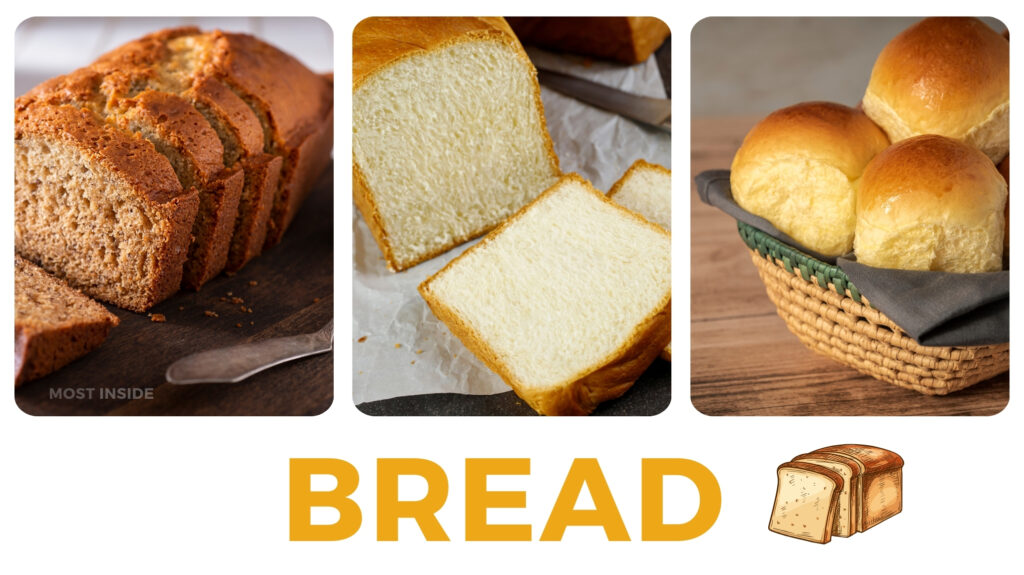Advantages & Disadvantages Of Eating Bread
This post was last updated on May 11th, 2024

Food consumption patterns of people across the world vary mostly due to climatic conditions, age old traditions and even religious ethics. Even the socio-economic status determines the type, quality and quantity of food that people eat. Despite different countries following different food habits, the acceptance of bread in the diet has largely increased globally. It has acquired a prominent place specifically in breakfast and snacks, irrespective of the fact that breads have high amount of carbohydrates. In fact, studies have found that processing of wheat for preparing bread eliminates its bran and germ, which are loaded with fibre and vitamins. Lack of these essential fibre and vitamins along with high glycemic index and gluten content makes bread a risky food for the health.
Modern study reports suggest that eating bread on regular basis can increase risk of suffering from lifestyle diseases and it impacts significantly to children who have comparatively sensitive internal bodily systems.
If you are wondering how the wholesome seeming instant breakfast item is harming your health, here are some potential disadvantages of eating bread you must know:
1. High Blood Sugar
One of the major disadvantages of easting bread is its high glycemic index owing to which your blood sugar levels soar as your body starts absorbing carbohydrates at greater speeds. Bread contains amylopectin A that triggers your body to digest and absorb the sugar content within seconds. Frequent consumption of such food items can make you prone to diabetes, kidney stones and even heart diseases.
2. Causes Inadequate Energy Production
Bread lacks vitamin B that abstains your body cells from converting carbs into required energy. Since carbohydrates provide 75 percent of the energy to the body, lack of vitamin B can affect your brain and functioning of other internal organs. You may start feeling lethargic due to less energy production.
3. Increases Bad Cholesterol
Vitamin E and fibre that are hardly present in bread are extremely important for lowering the LDL or low density lipoproteins that are popularly known as bad cholesterol. This bad cholesterol stimulates the oxidation process that results in free radicals to settle in the blood and form layers of fat in the blood vessels, thus restricting the flow of blood. Gradually the plaque like formation of fats leads to occurrence of heart diseases. Dietary fibre prevents the movement of bad cholesterol in the blood stream and binds it to get eliminated in the stool. Vitamin E on the other hand, flushes out the free radicals from the blood.
4. Constipation
As the white bread is devoid of bran, it lacks fibre which stimulates slow digestion of food. Thus, regular consumption of bread can cause constipation. Dietary fibre is crucial for softening, binding and improving the digestion process of food and slow movement of food in the intestines can prompt the large intestines or colon to absorb all the remaining moisture. This leads in dry, crumpled and hard stools followed by abdominal pain.
5. Obesity
Lack of dietary fibre in bread causes constipation and frequent consumption may lower your metabolic rate. Owing to this, the proteins and fats start accumulating on your body. Also the carbohydrates are faster converted into sugar rather than energy, thus causing increase in weight. Studies have found that long term consumption of white bread can be a potential reason for obesity.
6. Formation Of Mucus
Breads have the natural ability to cause mucus inside the body. This is why long term consumption can cause troubles in lung and nasal passages and often a sense of congestion may be felt. Elderly people may suffer additional symptoms such as decreased immunity levels.
7. Hardly Comprises of Essential Nutrients
In the quest to satisfy our hunger, we have started compromising on the nutritional content of the food by consuming unhealthy and junk foods. While bread efficiently meets our hunger needs, it hardly has nutritional value that can aid in improving our health.
Taking all these disadvantages of eating bread into consideration, medical studies have found that eating whole wheat bread can save you from these possible dangers of eating the white bread. The whole wheat bread is manufactured in a way that packs all the goodness of bran and germ to give you the necessary dosage of fibre, minerals, vitamins and carbohydrates, making whole wheat bread a great food to start your day with.
The labels mentioned in bread packs are often confusing while choosing between 100 percent whole wheat bread and wheat flour bread. Even the white refined flour is made from wheat and therefore, purchase bread that clearly mentions that it is made from 100 percent whole wheat to avail complete nutritional package offered by wheat grain.
Here are some of the advantages of eating whole wheat bread that can motivate you to continue bread consumption for its nutritional benefits:
1. Healthy Digestive System
100 percent whole grain wheat breads are great source of bran fibre that improves the bowel movements by softening and raising the bulk of the stools making it easier to pass through the intestines. It has been studied that instead of taking medication for irritable bowel syndrome, you can add few slices of bread in your diet and have it three to four days a week to enjoy better health.
2. Reduced Chances Of Heart Diseases
A study found that whole grains are extremely beneficial in reducing the risk of coronary heart diseases. The study tenure was of 14 years where 42850 male volunteers aged between 40 and 75 years participated. It was concluded that men who incorporated three servings of whole grains in their diet on daily basis had considerably lower risk of coronary heart disease.
3. Prevents Weight Gain
One of the most important advantages of eating bread is that its whole wheat content helps in maintaining weight. As per a study published in the American Journal of Clinical Nutrition, women who frequently consumed whole grains weighed less in comparison to women who consumed fewer grains. Another study reported that women who ate whole grain foodstuffs had 49 percent lower risk of gaining weight in comparison to women who had refined grain products.
4. Great For Mental Health
Inside the whole wheat kernel comprises of the wheat germ that acts as a rich source of magnesium, phosphorus, vitamin B, vitamin E, iron and zinc. Many medical experts are of the opinion that having foodstuffs comprising of vitamin B and E regularly can help in maintaining great mental health while also improving various mental disorders like Alzheimer’s and depression.
You may like this
Recommended For You
6 Ways to Stay Healthy During Pregnancy
Snehashree Bhat
A young writer who loves to pen words from creative perspective. Passionate internet surfer, a versatile homemaker and a person who finds pleasure in adopting healthier and positive changes in her persona. An enthusiastic feminist who wishes to make serious changes in the stereotypical thought process of the society via the voice of her words.




